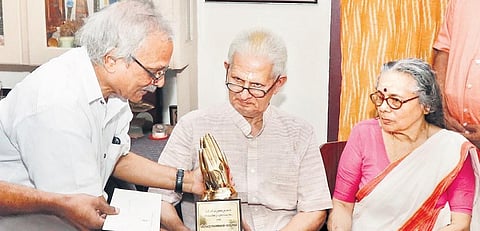

THIRUVANANTHAPURAM: “He remained a restless soul the whole night, immersed in deep thought, calling up people to discuss and writing notes to higher-ups. He was so upset and disturbed,” was how writer and psychologist Dr N Adithi, daughter of Vishnunarayanan Namboothiri, once recalled an eventful night when activist Medha Patkar was leading a Narmada Bachao Andolan protest. His poetic anguish soon came out in verse: Medha Patekar, Iruttilengottu nee pokunnu, Sudhi thaan velli mandaarameh...Namboothiri belonged to that rare genre of poets with ingrained traditional Indianness, while simultaneously advocating progressive ideals.
A serene soul, he was one of the most silent yet active advocates of environmentalism among his contemporaries. One of the resounding voices of the modernist movement in Malayalam poetry, Namboothiri was never one to turn his back on the Indian ethos. In fact, traditionalism and progressiveness existed in tandem in his writings.
A man who wore the mantle of a temple priest with pride, Namboothiri was also a staunch supporter and advocate of the first Communist ministry that brought land reforms to Kerala.
A poet who drew inspiration from masters like N V Krishna Warrier, Namboothri had a special place for late poet Vyloppilly Sreedhara Menon in his heart and also shared a deep-rooted respect and brotherly affection for veteran poet Sugathakumari.
More than a poet, he would be remembered as a teacher, a genuine human being with a progressive outlook and a rare blend of the old and the new. Namboothiri had himself said he would rather be remembered as a teacher than a poet.
He, however, never underestimated the power of the pen. “Writing is not merely a skill, but a culture in itself. It is not knowledge alone, but insight as well,” he liked to remind his readers. Even when his poetry and outlook in life reflected Indian spirituality, he was always eager to imbibe the best from Western masters. He had himself indicated that he was greatly influenced by Irish poet W B Yeats and India’s own Kalidasa.
Speaking after being bestowed with Ezhuthachan Puraskaram in 2014, he recalled a visit made by Yeats to wartime Europe. “On being asked why he had come at such a time, Yeats replied that he was there to write the Gita for Europe. A journalist then asked whether he should not have visited India instead. Yeats rose, and with his palms folded, replied, ‘I’m not mature enough to set foot on the Indian soil’. India is the land of writers and writing,” he said.
He could well be among the last line of poets from a different era. The subtle balancing of the modern and traditional, though deeply admirable, did also draw blood at times. Such unambiguous approach undoubtedly brought in its share of controversies too. The most widely discussed among them was his decision to lead the Somayagam in 1984. If this provoked the progressive, his 1997 visit to the UK for a lecture on Indian spirituality drew the wrath of the orthodox. On both occasions, however, he never wavered from his stance.
His poems remained serene, mature and mellifluous. Occasionally, the deeply sentimental and romantic poet in him woke up with verses such as Ninnekkurichini enthu paadendu njan? Ninne kurichenthu padauvanallenkil? (What should I sing about you? What’s there to sing?) A poet par excellence, a compassionate human is how Namboothiri will forever be remembered in poetic circles and beyond.